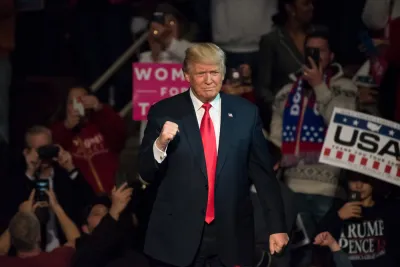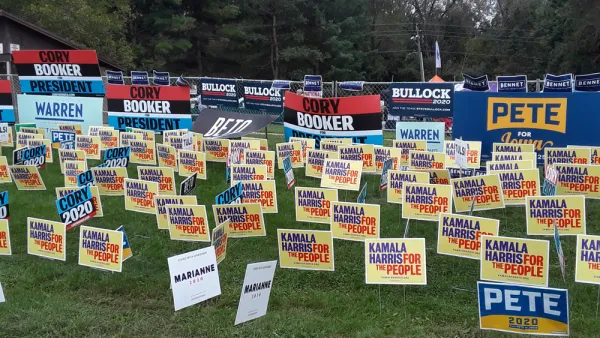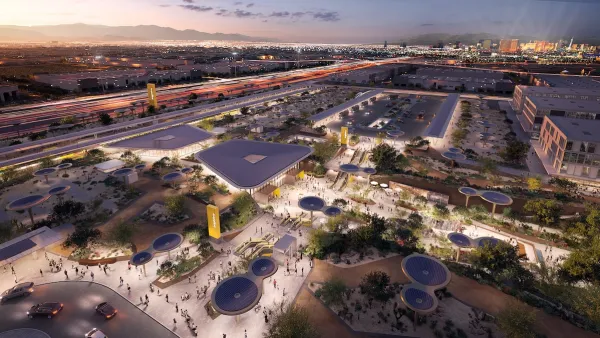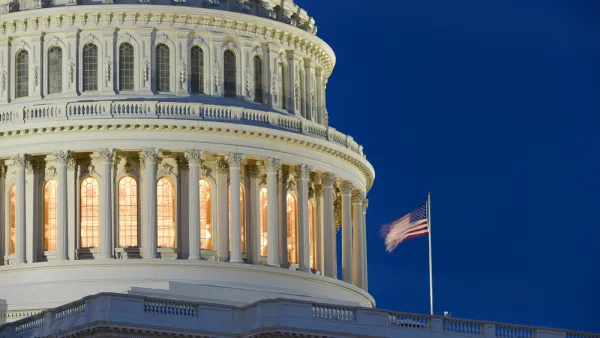The Trump Administration is sending out mixed signals on public transit issues. Why?

In its first week, the Trump Administration sent mixed signals on transportation issues. Part of the Trump transition team is drafting a budget, and some leaks suggest that this budget will include large spending cuts in a wide variety of federal programs. Apparently, early budget drafts are based on the Heritage Foundation’s budget proposals. Since Heritage wants to wipe out funding for public transit, it is possible that the Trump budget could support similar policies.
On the other hand, the transition team has been working with a list of infrastructure projects that the incoming Trump Administration might support. [Ed's note: the veracity of this draft list has been disputed, but McClatchy has since verified the exact origins of the list.] Even though the list includes road and air projects, it also includes:
- High-speed rail between Houston and Dallas;
- Commuter rail from Dallas to Fort Worth;
- Expansion of New York City's new Second Avenue subway;
- The Purple Line, a light rail line running through Washington’s suburbs;
- Detroit’s M-1 streetcar projects; and
- Extensions of Boston's Green Line trains.
What's going on? Since the Trump campaign speculated about public-private partnerships, it might be the case that the Trump Administration likes transportation as long as it is financed in nontraditional ways. And if we had a conventional President, who expected to win the election and whose transition team had been in place long before the election, this version of reality would seem persuasive to me.
But it seems to me that this administration might be a bit more disorderly than most. I'm not sure that President Trump ever expected to win the election, and transition head Chris Christie was fired a few days after the election. He was replaced by Vice President Pence, who seems to be a more orthodox, anti-government conservative than President Trump.
Under the circumstances, it might be the case that groups within the transition team aren't really speaking to each other, and so the anti-government types in "Office A" haven't coordinated their proposals with the infrastructure-lobby types in "Office B." Ultimately, President Trump may have to arbitrate disputes between his administration's moderate and conservative wings—and then Congress will have to decide to what extent it should uphold his verdict.

Analysis: Cybertruck Fatality Rate Far Exceeds That of Ford Pinto
The Tesla Cybertruck was recalled seven times last year.

National Parks Layoffs Will Cause Communities to Lose Billions
Thousands of essential park workers were laid off this week, just before the busy spring break season.

Retro-silient?: America’s First “Eco-burb,” The Woodlands Turns 50
A master-planned community north of Houston offers lessons on green infrastructure and resilient design, but falls short of its founder’s lofty affordability and walkability goals.

Test News Post 1
This is a summary

Analysis: Cybertruck Fatality Rate Far Exceeds That of Ford Pinto
The Tesla Cybertruck was recalled seven times last year.

Test News Headline 46
Test for the image on the front page.
Urban Design for Planners 1: Software Tools
This six-course series explores essential urban design concepts using open source software and equips planners with the tools they need to participate fully in the urban design process.
Planning for Universal Design
Learn the tools for implementing Universal Design in planning regulations.
EMC Planning Group, Inc.
Planetizen
Planetizen
Mpact (formerly Rail~Volution)
Great Falls Development Authority, Inc.
HUDs Office of Policy Development and Research
NYU Wagner Graduate School of Public Service





























